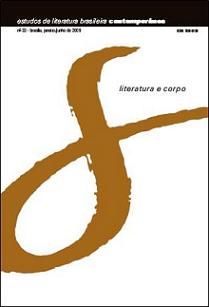Entre Amazonas y el Oriente:
el Orientalismo revisitado em Relato de um certo Oriente, de Milton Hatoum
Resumen
Milton Hatoum se autodefine como um autor que escreve a partir da "margem da história", referindo-se tanto à sua etnia quanto ao seu local de nascimento, ou seja, a Amazônia brasileira. Como forma de me aproximar da escrita marginal de Hatoum, proponho iniciar este ensaio com uma breve discussão sobre o contexto específico em que se desenvolveram os discursos dos Orientalismos ibéricos e latino americanos, discursos que se integraram aos debates nacionalistas brasileiros. Por meio da leitura do romance Relato de um certo Oriente, argumento que Hatoum resiste tanto a esses discursos, quanto à estética regionalista predominante numa vertente importante da ficção brasileira.
Descargas
Citas
CANDIDO, Antonio. Formação da literatura brasileira: momentos decisivos. 2 v. São Paulo: Martins Fontes, 1969. Una traducción al español de la introducción en Alberto Vital (ed.), Conjuntos: teorías y enfoques literarios recientes. México, UNAM, 2001.
FRANCO, Jean. “The nation as imagined community”, en Veesser, H. Aram (ed.). The New Historicism. New York: Routledge, 1989.
HATOUM, Milton. Relato de um certo Oriente. 2ª ed. São Paulo: Companhia das Letras, 2000 [1989].
_______. “Escrever desde a margem da história”. Revista de Estudos Árabes, v. 2, nº 4, jul.-dic. 1994, p. 67-72.
KUSHIGIAN, Julia. Orientalism in the Hispanic literary tradition: in dialogue with Borges, Paz and Sarduy. Alburquerque: University of New Mexico Press, 1991.
LESSER, Jeffrey. “(Re)creating ethnicity: Middle Eastern immigration to Brazil”. The Americas, v. 53, nº 1, 1996, pp. 45-65.
LOWE, Lisa. Critical terrains: French and British orientalisms. Ithaca, NY: Cornell UP, 1991.
MOYSÉS, Adriana. “Milton Hatoum lança, na França, seu primeiro livro infantil, Nas asas do condor”. RFI ”“Português do Brasil: el 5 de mayo del 2005. Disponível em URL: <http://ww.rfi.fr/actubr/articles/072/article_196.asp>.
PELLEGRINI, Tânia. “Milton Hatoum e o regionalismo revisitado”, en CRISTO, Maria da Luz Pinheiro de (org.). Arquitetura da memória: ensaios sobre os romances de Milton Hatoum. Manaus: Editora da Universidade Federal do Amazonas, 2007.
PRATT, Mary Louise. “Edward Said’s Culture and Imperialism: a symposium”. Social Text, nº 40, 1994, pp. 1-24.
SAID, Edward W. Orientalism. New York: Random House, 1979.
SLATER, Candace. Entangled edens: visions of the Amazon. Berkeley, CA: University of California Press, 2002.
VOGELEY, Nancy. “Turks and Indians: Orientalist discourse in postcolonial Mexico”. Diacritics, v. 25, nº 1, 1995, pp. 2-20.
Descargas
Publicado
Cómo citar
Número
Sección
Licencia
Los autores que publican en esta revista concuerdan con los siguientes términos:
a) Los (los) autores (s) conservan los derechos de autor y conceden a la revista el derecho de primera publicación, siendo el trabajo simultáneamente licenciado bajo la Licencia Creative Commons de Atribución-No Comercial 4.0, lo que permite compartir el trabajo con reconocimiento de la autoría del trabajo y publicación inicial en esta revista.
b) Los autores (a) tienen autorización para asumir contratos adicionales por separado, para distribución no exclusiva de la versión del trabajo publicada en esta revista (por ejemplo, publicar en repositorio institucional o como capítulo de libro), con reconocimiento de autoría y reconocimiento publicación inicial en esta revista.
c) Los autores tienen permiso y se les anima a publicar y distribuir su trabajo en línea (por ejemplo, en repositorios institucionales o en su página personal) después del proceso editorial, ya que esto puede generar cambios productivos, así como aumentar el impacto y la citación del trabajo publicado (ver el efecto del acceso libre).
d) Los (as) autores (as) de los trabajos aprobados autorizan la revista a, después de la publicación, ceder su contenido para reproducción en indexadores de contenido, bibliotecas virtuales y similares.
e) Los (as) autores (as) asumen que los textos sometidos a la publicación son de su creación original, responsabilizándose enteramente por su contenido en caso de eventual impugnación por parte de terceros.


